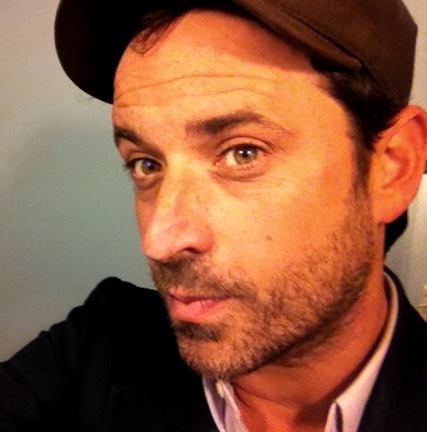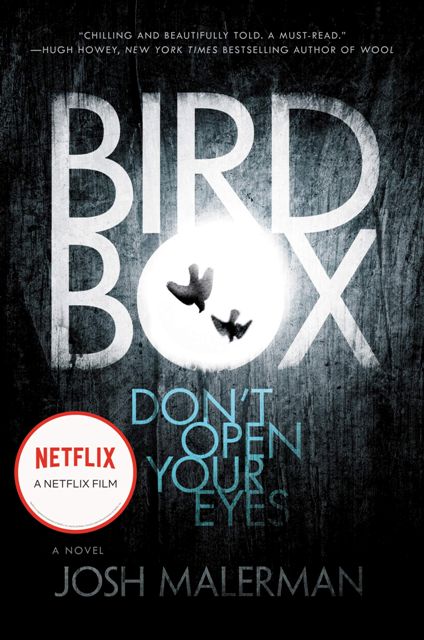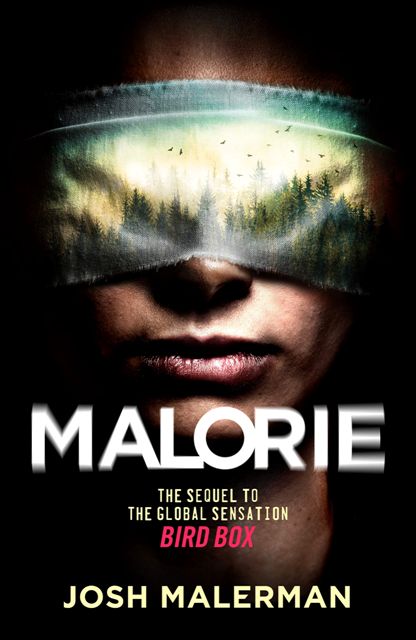

On this month's Special Page:
An exclusive interview with the author of Bird Box and Malorie: Josh Malerman
IN THE "SPECIAL PAGE" ARCHIVES:
Ellen Datlow
Bentley Little
Simon Clark
John Russo
Mark Lukens
Joe R. Lansdale
Douglas Clegg
INTERVIEW WITH JOSH MALERMAN
INTERVIEW CONDUCTED BY TRISH WILSON
TRISH WILSON: Not only are you an award-winning writer, you have also sung in a rock band. When did you start The High Strung, and what kind of music do you sing? Where'd the name come from?
JOSH MALERMAN: We started playing for real around 2000. We’d all been best friends since we were 11 years old, but I didn’t start playing an instrument/writing songs till I was 19, 20. Around there. Derek (drums) and Chad (bass) had been playing forever by then. I tried to write stories, novels, poems, etc, but it was all vague back then. The early days are like that, right? Because you don’t quite have the identity yet. Even if you sense it’s coming. At some point my creative life intersected with that of my friends and things developed quick from there. Me and another friend Mark Owen started playing guitars and writing songs and singing them for the band. The High Strung formed in New York City. Those were magic years. Then we hit the road for what amounted to 6 or 7 years straight. Some 250 shows a year. Total beautiful chaos. A DIY masterpiece. We’re working on three new albums now. Hannah, Southfield, and one to be named.
TRISH WILSON: Do you listen to music when you write? If so, what kind of music?
JOSH MALERMAN: Usually yes. Horror soundtracks, instrumental stuff. Lyrics can be distracting but I also feel like I’m just used to saying that, so I’m saying that. Maybe if I tried songs with lyrics nowadays I wouldn’t think they were distracting at all. You’ve inspired me to change. By just asking a question. But, also, some of the soundtracks I love: Creepshow, Under the Skin, Unforgiven, Troll, The Boogeyman, Tourist Trap, The Thing, The Beyond.
TRISH WILSON: Bird Box – where did the idea come from?
JOSH MALERMAN: The book started with just an image. A mother and two children blindfolded, navigating a river, escaping something. I started before I knew anything about them or their scenario, but by page two I understood I better figure it out. So, I kinda sat back, thought it out, and returned with it all minutes later. Bird Box was a golden experience for me, the rough draft: some 4,300 words a day for 26 days. Then? Done. The rewrites were crazy, as most rewrites are… but that rough draft was the kind of experience we’re all gunning for every time we sit down to write. Fluid, free. I would write from 8AM to about noon. And by the time I went to sleep each night, I knew what I was going to write the next morning. No speed bumps with that one.
TRISH WILSON: How long did it take to write Malorie? Tell us a bit about the book.
JOSH MALERMAN: Well, I wrote one version in 15 days, scrapped it, and wrote the official one in a month or so. Again, the rewrites were extensive, so it always feels weird to say it only took a couple weeks. It went fast and took forever, like everything else, right? The book opens at the School for the Blind but the bulk of it takes place ten years later, as Malorie and her (now) teenage kids are visited by something of a census man who leaves a list of stats on the modern world. Included is a list of survivors from the first wave of creatures. And on that list are a couple names that mean a great deal to Malorie. So begins a very dangerous journey out. I really enjoyed writing her teenagers. They gave Malorie peers, rather than the helpless things they were in Bird Box.
TRISH WILSON: What is it about horror that appeals to you?
JOSH MALERMAN: The imagination, the arrested development, and, most of all, the fact that a part of me still believes all of this is possible. Ghosts and monsters, animated corpses, mad doctors. I get scared, in a wonderfully dark way. I imagine I have a sense of horror in the same way people have a sense of humor. But, you know, you gotta be careful, right? Some movies, some books, and even some thoughts are enough to knock you off-kilter for weeks. But isn’t it always a bit like survival? Returning to your natural state, after weeks of being freaked out? I love it all.
TRISH WILSON: What are some of your favorite horror stories? Horror movies?
JOSH MALERMAN: Lately it’s been Charles Beaumont, Anne Rice, Ania Ahlborn, Kathe Koja, John Skipp. They’ve been blowing my lid, as they always do. As goes movies: a couple great new ones I saw, both on Shudder: Scare Me and After Midnight. Both phenomenal in their own, wholly original, ways. Both break all kinds of rules, and have fun doing it.
TRISH WILSON: What themes tend to pop up frequently in your work, if any?
JOSH MALERMAN: Well, I think it takes a while before you can detect such things. You need to write quite a bit to see recurring themes, and, maybe, as they change, as you enter new phases, the prior phases are illuminated. A thing I’ve really noticed in a ton of my stories is what I call “once removed” or “off-camera.” Not emotionally “once removed” but rather a step to the right of what might be considered a more traditional horror story. Bird Box, for example… the monsters are always off-page. In Dandy, the titular Dandelion Andrews builds a true house of horrors beneath the fun, phony one at the county fair. In A Nightmare Got In, two boys eavesdrop upon an exorcism of a house, but they aren’t present at the ritual. See? Off-camera. Once removed. Yet… none of this was/is planned on my part. I guess I’m just attracted to these ideas. Writing one now about a man who, on his death bed, confesses to all the crimes he didn’t commit, but wanted to. Again, in its way, off-camera. I would need to think more on this before I declared what it means, for me, but I suspect it has something to do with fresh angles. It’s exciting to come at a story from beneath it, above it, outside it, or deep within it. Even the short story of mine that’s up for a Stoker this year (“One Last Transformation”) is about an elderly werewolf at the end of his run. Still seems to qualify, in terms of what I’m talking about here. And A House at the Bottom of a Lake clearly does it, as it’s a haunted house story, but… at the bottom of a lake. I’ll think more on all this. Or maybe I won’t. I wouldn’t want to get in my own way.
TRISH WILSON: What is your greatest fear? Considering Bird Box, what does blindness signify for you?
JOSH MALERMAN: Tough question to answer, right? Scared of many things. But I think losing one’s mind is the worst for me. Snapping. The idea that you could be whoever you are and then… not. That’s beyond loss of control. It’s loss of identity, too. Not a nice thought. And as goes blindness, in terms of the book… I think it has to do with the things that are beyond our comprehension. Encountering those things. Fleeing from them, too. I suppose Bird Box and Malorie delve deep into the idea of losing one’s mind by virtue of what you see, and shouldn’t.
TRISH WILSON: Do you have a writing routine? What is it? Any rituals?
JOSH MALERMAN: So, I don’t have a singular routine. It’s more, book by book. Once I begin one, I work on it every day until it’s done. I’m wary of marathon sessions because I’d rather work on the book consistently and if you explode one day, you may not write for the couple following. Still, huge sessions are fun. So, I don’t know if there’s a method per say, other than a somewhat militant understanding that, in order to get this done, I actually have to do it. Thing is, I’ve written 33 books now. And every one of them was fueled by enthusiasm more than anything else. For me it’s a matter of controlling that feeling, teasing it out, day by day, until the book is done.
TRISH WILSON: How did you come to acquire your agent? What advice would you give writers who are looking for agents? What makes a good query?
JOSH MALERMAN: My story here is a strange one. I’d written some nine novels and had been posting updates online when a friend from high school called to say he knew a lawyer who represented authors. I sent the lawyer a book, he told me he’d like to represent me. He also said he had a good manager duo in mind. He sent them the book, they took me on. And it was one of those managers (who is still my manager, the other retired) and the lawyer who sent Bird Box to Kristin Nelson. So, I’m not the best person to answer this, because I didn’t go through the process of reaching out to agents. Not one. Yet, here I am. I suppose the best thing I could say, from my experience, is: don’t be afraid to talk about what you’re doing. Birds of feather flock together and if you’re talking about what you’re working on, you’ll naturally meet other people who either write books or do something adjacent to writing/publishing. I wasn’t focused on finding a publisher in those days; I was just writing at top speed. Still am. So, while I recognize how fortunate I am that Dave Simmer contacted me about that lawyer… I also understand that I was prepared to get lucky. By writing. A lot.
TRISH WILSON: Did you have mentors early in your career who helped you? If you did, who were they? What kind of help did they give you? I've noticed some writers have had mentors and they've maintained professional relationships and even friendships with them.
JOSH MALERMAN: So... I didn't have what might properly be called "mentors," but man did I have help. Before Bird Box was shopped to Kristin Nelson, my two managers (at the time I had two, Ryan Lewis and Candace Lake; Candace has since retired), taught me how to rewrite for the first time in my life. I'd never had cause to rewrite before meeting them. I was just blindly in motion. And once Bird Box was published... there have been endless authors who have helped. Peter Straub blurbed Bird Box. Christopher Golden introduced me to Earthling Pub who put out Goblin originally. Jonathan Maberry has been the best friend a guy could ask for. And Kathe Koja... who lives but a few miles from me, provides me with insight on the publishing world, and the artistic life, with every sentence she speaks.
TRISH WILSON: What was it like seeing Bird Box turned into a movie? How was the Hollywood experience for you?
JOSH MALERMAN: It was… everything. Electricity, ecstasy. And I’m not exaggerating. And the Hollywood experience is still going on, just beginning, as my manager Ryan Lewis and I started a production company called Spin a Black Yarn. We produced our first movie this past October. We Need to Do Something is based on Max Booth’s book of the same name. It’s all really thrilling, of course, and we’re developing a number of my stories/books as well as books by other authors in the genre. But back to Bird Box… Allison and I saw the movie at the Netflix headquarters in Los Angeles, in a screening room called The Upside Down, and I was floored, speechless, throughout. Sandra Bullock as Malorie. I’ll never quite get over that. She’s the Audrey Hepburn of our generation. The whole experience was inspiring, welcoming, warm… I just can’t say enough good things about the producers, cast, screenwriter, all. I could write a book about the experience; being backstage with the cast before the premiere at Mann’s Chinese Theater. The afterparty. The premiere in New York. Interviews. The red carpet. Taking a photo with Sandra Bullock on the red carpet. I could go on. May I? Haha. Put it this way: the whole thing was so amazing for me that I now regularly order the soap from the Hollywood hotel we stayed in the night before and the night of the premiere, just so that I always have the scent of that night with me, close by, at all times.
TRISH WILSON: What advice would you give to writers, especially those who are struggling, maybe getting published but not getting much attention? It's so difficult now to gain an audience because we are overrun with published books. With Amazon these days, anyone can publish a book. There is a glut of dreck out there. How can you stand out in the crowd and get readers?
JOSH MALERMAN: You know… I want to say so much here. It’s a question that deserves a nuanced, lengthy discussion. I do worry that people can tell if you’re trying to sell them something, right? So, I guess don’t hide it if you are? But, you see, even that silly little statement deserves so much more discussion. I know this: work with joy, present with confidence, and stay in motion. I’m a huge believer in momentum: so long as you stay in motion, you may not end up where you envisioned yourself going, but you will undoubtedly end up somewhere.
TRISH WILSON: What kind of promotions have worked for you? Blog tours, convention appearances, book tours, radio appearances, etc.?
JOSH MALERMAN: Everything. It helped that I had been in a band, touring the country, for years, before I got a book deal. I was very used to the DIY life. And even if you get a publisher, even a big one, you can still do so much. Sometimes it’s hard to come up with new ways to do things but the truth is, we’re all naturally different, we’re all individuals whether or not we mean to be, and how we roll out our books will be so, too.
TRISH WILSON: What projects are in the works now?
JOSH MALERMAN: Goblin comes out May 18. Pearl on October 12. There’s also a limited-edition novel coming in December, one that hasn’t been announced yet. I’m working on next year’s books, in terms of writing and rewriting. And a couple short stories. And, as goes the band. We’ll be releasing Hannah later this year and working on the other two I mentioned above. All very exciting, to say the least. Stories and songs, books and albums… it’s all a dream, but one I’m wide awake for, and it’s all a wonderful balance of work and joy.
TRISH WILSON: What is one important piece of advice you would you give to writers?
JOSH MALERMAN: For the duration of the rough draft, get rid of the words “good” and “bad.” It doesn’t matter how “good” the book is in that stage. What would you rather have: 300 pages that you can shape, make better? Or no pages at all? So… get through the first draft with as much joy and verve as you can, then get serious with the rewrite. You can be two people at once: the joyful, manic writer, and the studious, exacting editor. You can also think “I suck!” and “this is amazing” at the same time, too. Whatever it takes to get through that first go-round… do that.
TRISH WILSON: Where can we find you on the web? Web site, Facebook. Twitter.
JOSH MALERMAN: I’m just Josh Malerman everywhere. And my website (joshmalerman.com) became more exciting recently as I serialized a novel, live, for free. Carpenter’s Farm is up there still and should remain so for as long as I can see. The webmaster, Todd Jackson, presented it all in a gorgeous way, fonts and colors, and it remains one of my favorite of my own books. So… yeah! Go check it out, for free. It’s a mindbender, to say the least.
About Josh Malerman

Josh Malerman is the New York Times best selling author of Bird Box and A House at the Bottom of a Lake. He's also one of two singer/songwriters for the Detroit band The High Strung, whose song "The Luck You Got" can be heard as the theme song for the hit Showtime show Shameless. He lives in Michigan with the artist/musician Allison Laakko.
About Trish Wilson

Trish Wilson writes horror with the pen name E. A. Black. Her short stories have appeared in The Horror Zine’s Book of Ghost Stories, The Black Stone: Stories for Lovecraftian Summonings, Wicked Women: An Anthology of the New England Horror Writers, and more. She won a Best Short Story mention on The Solstice List@ 2017: The Best of Horror for Invisible, which appeared in Zippered Flesh 3. She lives on the Massachusetts coast in Lovecraft country. The beaches often call to her, but she has yet to run into Cthulhu.

